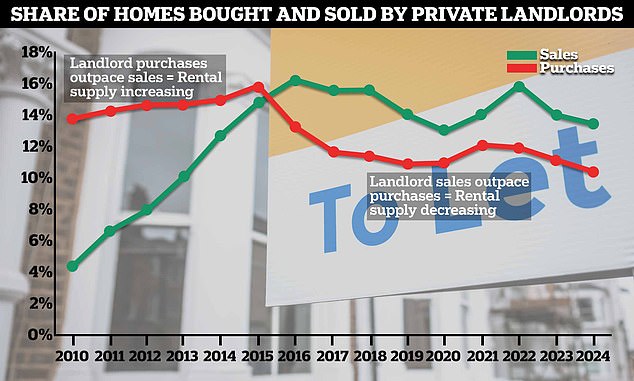Record number of former rental properties for sale as more and more landlords move out
According to the latest figures from Rightmove, landlords appear to be selling their properties en masse.
The number of former rental properties for sale is the highest ever, the real estate portal announced today.
According to the report, 18 percent of homes now for sale were previously available for rent, up from 8 percent in 2010.
Enough said: The percentage of former rental properties coming onto the market for sale is at an all-time high, according to Rightmove, indicating that more landlords are selling their properties
London landlords in particular appear to be heading for the exit, with almost a third of homes for sale in the capital previously rented.
In Scotland and the North East of England, too, many homes are being sold by landlords. In both regions, 19 per cent of homes on the market were previously rented.
Is this an exodus or a gradual departure?
Although it clearly seems that more and more landlords are selling their properties, there is still no sign of a large-scale exodus.
On average, 14 percent of homes for sale on Rightmove over the past five years were former rental properties, so the current figure of 18 percent does not necessarily represent a huge change.
According to Rightmvoe, the number of homes for sale has risen to a seven-year high, with the average estate agent having 33 homes to sell.
This means that there are currently an average of six to seven former rental properties for sale per estate agency.

It’s losing its calling: almost a third of all homes for sale in London were previously available on the rental market
Tim Bannister, property expert at Rightmove, says that while there is a trend of more landlords selling their properties, there does not appear to be a mass exodus.
“We need to keep a close eye on the long-term impact of the supply of rental properties being put up for sale,” Bannister said.
‘For example, these homes could offer more choice to first-time home buyers.
“They could also be bought up by other landlords and put back on the rental market. That would be more of a changing of the guard than a complete departure of landlords.”
Although some landlords appear to be selling their properties, there also appear to be fewer landlords buying their properties.
The percentage of homes bought by landlords has fallen to the lowest level in 14 years, according to to the real estate agent Hamptons.
According to the report, only one in ten homes sold in the first half of this year went to a rental investor, the lowest percentage since the measurements began in 2010.
As a result, the rental market appears to be gradually shrinking.

Sell-offs: Landlords bought just 10% of all homes sold in the first half of this year, the lowest percentage since 2010, according to real estate agent Hamptons
According to consultancy TwentyCi, the number of rental properties in the UK has fallen by a quarter since 2019.
According to the report, the number of rental properties is at its lowest level since data collection began 15 years ago.
And because there are fewer and fewer homes for tenants to choose from, rents continue to rise.
Chris Norris, policy director at the National Residential Landlords Association (NRLA), said Rightmove’s findings raise serious concerns for all tenants struggling to find their own place.
“With demand already far outstripping supply, Rightmove expects the situation to only get worse,” Norris said.
‘Every rental property that is sold only increases the imbalance between supply and demand.
‘While some of these homes will inevitably end up on the owner-occupier market, that will provide little comfort to households struggling to access quality housing.’
Why do landlords sell?
Some landlords may be considering selling their homes due to the proposed increase in capital gains tax (CGT) in the October 30 Autumn Statement, as a result of the perceived £22 billion black hole in the national finances.
It’s no secret that Finance Minister Rachel Reeves is looking for ways to tackle this problem, as many fear tax increases.
Such a tax increase could be on the table for CGT. This is the tax paid on profits made during the time someone owns an asset.
Currently, landlords who pay a higher rate of tax pay 24 percent CGT tax on the profit they make on the sale of their property.
There are fears that CGT will be brought into line with income tax. This could mean CGT rates rising to 40 per cent for high rate taxpayers, or even 45 per cent for high rate taxpayers.
| Capital gain | Current base | If aligned | Influence | Current higher | If aligned | Influence | Current extra | If aligned | Influence |
|---|---|---|---|---|---|---|---|---|---|
| Earn | 18% | 20% | 24% | 40% | 24% | 45% | |||
| €10,000 | €1,260 | €1,400 | €140 | € 1,680 | €2,800 | €1,120 | € 1,680 | €3,150 | € 1,470 |
| €20,000 | €3,060 | €3,400 | €340 | €4,080 | €6,800 | €2,720 | €4,080 | €7,650 | €3,570 |
| €30,000 | €4,860 | €5,400 | €540 | €6,480 | € 10,800 | €4,320 | €6,480 | €12,150 | €5,670 |
| Source: Quilter | |||||||||
Neela Chauhan, partner at accounting firm UHY Hacker Young, believes a rise in corporate tax could encourage more landlords to sell their properties.
‘An increase in CGT in the budget will only lead to a faster exit of landlords from the buy-to-let market. Fewer landlords could lead to higher rents.
‘The decline in the number of landlords is the result of multiple governments working to make buy-to-let investments less attractive. This will not improve under the new government.
‘Many smaller landlords with only one or two properties are finding that the income is no longer worth the effort.’
Marc von Grundherr, director of London brokerage Benham and Reeves, also fears that a rise in corporate tax will damage the investment philosophy for physical stores.

Marc Von Grundherr, director at estate agency Benhams & Reeves, says a potential rise in CGT will worry many landlords
“The possible harmonisation of the CGT is of course a concern for many landlords,” said Von Grundherr.
‘If the Labour government goes ahead with this, it could lead to a significant increase in the tax paid by the average landlord when the time comes to exit the sector.
“This would be a further blow to those providing essential rental housing that is desperately needed, following a series of legislative changes already implemented in recent years that have eroded profitability.”
In addition to the CGT threat, there are other changes that landlords are concerned about.
Last but not least, the ban on no-fault evictions, changes to EPC rules and stricter regulations and permits.
Rightmove argues that there must be incentives for landlords to continue investing in the private rental sector to create a healthy market for tenants.
“In recent years, it has become more attractive for some landlords to exit the rental sector rather than remain invested in it, due to rising costs, taxes and legislation,” said Tim Bannister of Rightmove.
‘A healthy private rental sector needs investments from landlords to offer tenants a wide choice of housing.
‘We have seen in recent years how the imbalance between supply and demand can contribute to rising rents, so there is concern that if landlords are not encouraged to stay in the rental sector rather than exit, tenants will pay the price.
Some links in this article may be affiliate links. If you click on them, we may earn a small commission. That helps us fund This Is Money and keep it free. We do not write articles to promote products. We do not allow commercial relationships to influence our editorial independence.

